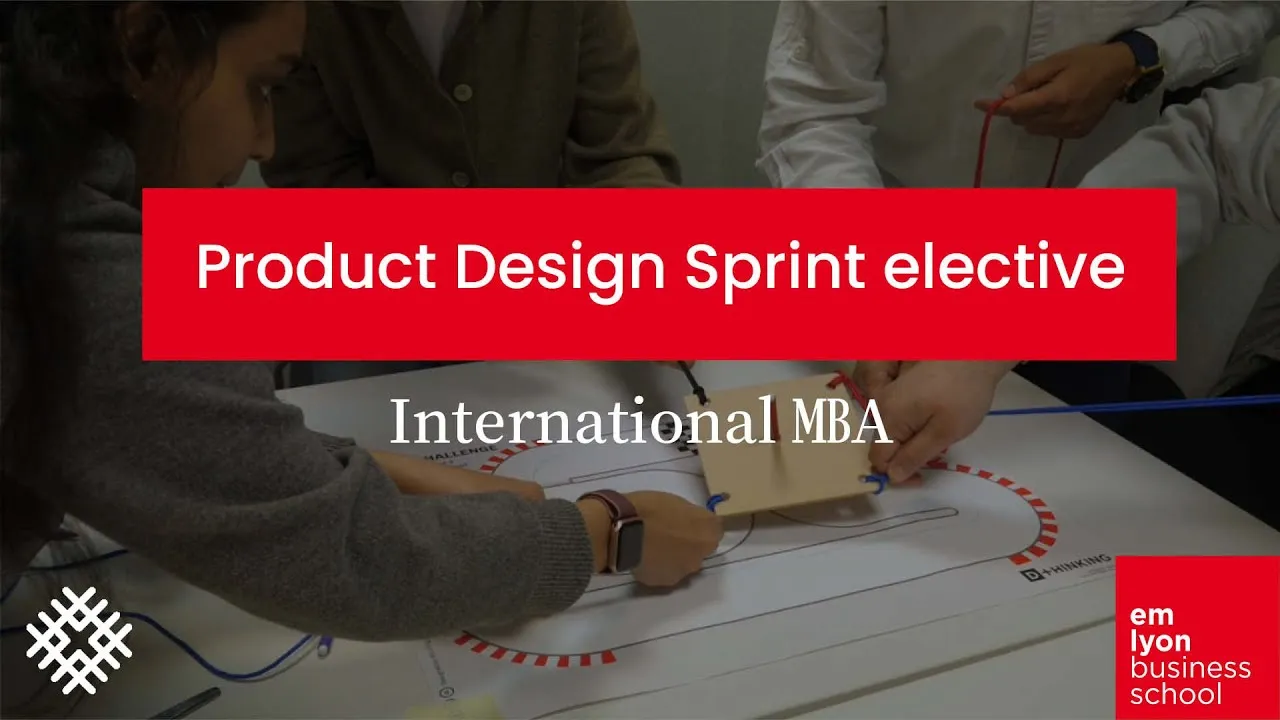The IMBA Product Design elective – when bright minds come up with bright ideas
Held in April, the Product Design elective saw groups of IMBA students working in teams on developing a complete product design sprint for development and deployment of a given product and accompanying service, under the expert eye of External Learning Facilitator Rémi Edart. Students Sanchali Pyne and Shrijit Mazumdar recount the challenges posed by this intensive learning process and the insight provided into the role of Product Manager.
For its second year in operation, the Product Design elective once again respected the “learning by doing” mantra that characterizes the whole IMBA program. The four teams of five to six students were put to work by Rémi Edart, Product Manager and Transformation Designer for dthinking academy and facilitator for the school's elective. For Rémi, it was important to remain “hands off” for what turned out to be a very hands-on exercise: “I approach this exercise much as one would enter a relationship. I come with no specific expectations of the students. Of course, I expect that they will be motivated and keen to learn but ultimately I am there to guide them in the mold of a team coach so that they learn and apply the right techniques without too much interference.”
Learning the ropes
Once the student teams had chosen the product that would provide the focus of their project, it was time to get down to business and learn the ropes via groupwork, intensive discussions, and the application of scrum methodology, ideation, and prototyping, before using product vision and business model canvasses to chart their progress. For Shrijit, this highly collaborative modus operandi and learning environment was extremely conducive to coming up with and then testing ideas: “Our product was an aero bike for Lime. It was an aerial bike which can be flown to multiple locations working through a model of charging stations placed in the city. It was to be powered by electric fuel cells which can be charged via DC charging. Discussion of the project was constant not just to generate new ideas but also to test the value proposition at every stage. We learned from mistakes and honed our soft skills all through the process. For the role of Product Manager, communication is vital so the sharpening of our soft skills was essential not just to the elective but will be once working in industry.”
Handling people and pressure
In the case of Sanchali, whose project centered "Bike of the Future" made of recycled plastic, maintenance free, convenient, and eco-friendly, the exercise provided a real eye-opener as to the pressures she may encounter in her future career: “a ludic approach was taken to much of the elective but we were nevertheless under constant pressure in terms of time and also the variety of areas and bases that needed to be covered to come up with a value proposition. This reflects the reality of working as a Product Manager, where you have to deal with a great many different stakeholders, understand all the workings of an organization and also interface with external parties, customers above all.” Coming from an IT background, Sanchali more than welcomed this new challenge: “There were elements of the elective that overlapped with my previous experience, but here more than ever before I had to be hands-on, pick up and apply the new processes learned in class, and use ideation techniques to conceptualize a proposed service to back up the product.”
Blending an innovative product with service design
In the non-professorial role that Rémi intentionally adopted, his main responsibilities were to guide and advise. “I saw my remit as being to assist the students deliver their proposal and help them perform well as a team. I was also keen to underline that in any innovation project, the final product and the service that accompanies it are indissociable. You cannot have one without the other. The message I drove home was to focus on a tangible product but ensure that a clearly defined service was attached to it. In support of this, each team had to design their own website to present their proposal in the clearest way possible.”
To achieve this, the students had to make sometimes difficult decisions. This, according to Shrijit, is one of the fundamental skills of the profession: “knowing how to work with different teams across an entire organization is crucial. To succeed in what is a very all-round position requiring all-round skills, you have got to know how to prioritize and remain user-centric at all times.” Despite the intensive nature of the whole exercise, Sanchali was struck by the fun element while learning on the job: “games were incorporated into the elective but serious ones with specific learning objectives. This helped relieve some of the pressure, but the goal remained the same serious one – producing an identified set of deliverables and a convincing, industry-relevant value proposition, whilst displaying business agility and bridging the gap between a smart idea, business basics, and digital marketing.”
